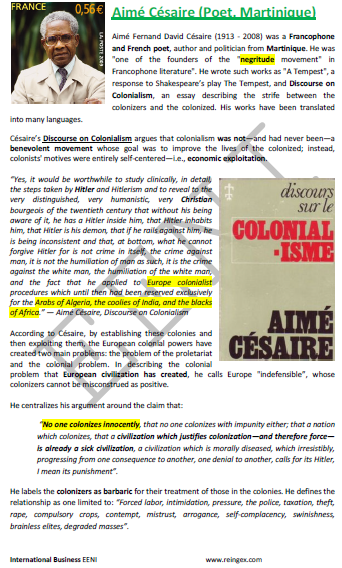
Aimé Césaire, Negritude, Poet, Martinique
Martinican Poet (Aimé Césaire). Negritude movement. Colonialism
- Aimé Césaire (Martinican poet)
- The concept of blackness of Aimé Césaire
Sample - Aimé Césaire (Poet, Martinique)


The Subject “Aimé Césaire (Poet, Martinique)” belongs to the following Online Programs taught by EENI Global Business School:
Doctorate: Ethics, Religions & Business.
Languages:  or
or  Aimé Césaire
Aimé Césaire  Aimé Césaire
Aimé Césaire  Aimé Césaire.
Aimé Césaire.
“Nobody colonizes inoffensively, those civilizations justifying colonization is an Ill Civilization” Aimé Césaire
The Martinican Poet, Author and Politician Aimé Fernand David Césaire (1913 - 2008) is one of the leaders and founders of the “Negritude Movement.” In his works; he criticized the “humanist” elucidation of colonialism.
- Place of birth of Aimé Césaire: Basse-Pointe (Martinique, the Caribbean)
- Founder of the Negritude Movement
- Founder of “Tropiques” (literary review) with his wife (Suzanne Roussi)
Main topics of the work of Aimé Césaire:
- “Négritude” (Léon Damas and Leopold Sédar Senghor)
- Effects of Colonialism
- For Aimé Césaire, the colonialism was a Western system based on the economic exploitation (Discourse on Colonialism)
- For him, colonialism, racism or barbarism is the same
Bibliography of Aimé Césaire:
- Discourse on Colonialism
- Notebook of a Return to the Native Land
- Miraculous weapons
- Tragedy of King Christophe
- A Season in the Congo
- Toussaint Louverture: The French Revolution and the colonial problem
(c) EENI Global Business School (1995-2024)
We do not use cookies
Top of this page


